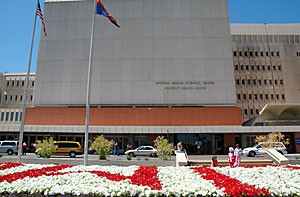A group of medical students at the UA is fighting for the right to allow abortions to be performed at University Medical Center.
In 1974, an education bill was passed to fund a $5.5 million expansion of the Arizona Stadium, but the bill also included a rider proposed by then-Rep. James Skelly, R-Scottsdale, that outlawed abortions to be performed at UMC – except to save the life of the mother.
The group of students, Medical Students for Choice, aims to supplement education from the UA College of Medicine that they feel is incomplete. They do this through lunchtime talks and evening workshops to provide a more complete education of reproductive health, said Gabe Sarah, a second-year medical student.
“”We are filling the gaps of the medical curriculum,”” Sarah said.
Medical students receive one lecture on abortion. Resident doctors at UMC in their third year of their OB-GYN rotation are allowed to observe the procedure, said an assistant professor of OB-GYN who wished to remain anonymous for safety reasons.
But this observation happens at Planned Parenthood, which has allowed residents to come and learn at its clinics.
“”They have agreed to allow us to do it. If they don’t, then where are we going to learn?”” Sarah said.
Residents who object to abortion morally or religiously also have the option to opt out of that particular rotation, Sarah said.
“”They have agreed to allow us to do it. If they don’t, then where are we going to learn?””
– Gabe Sarah
second-year
medical student
Elisabeth Woodhams, a fourth-year medical student and national coordinator for the western region of MS4C, said a training session is provided by medical students at Planned Parenthood before going to observe the procedure.
Additionally, Sarah said many students, even those who oppose abortion – some of whom are also members of MS4C – attend the training because they want to be educated.
“”It’s our job to counsel our patients on the pros and cons and then decide what’s best for each individual situation,”” Sarah said. “”It’s the same for cancer patients.””
There are many concerns among students and faculty that patients are being affected negatively by doctors who don’t know how to properly counsel a woman who is considering abortion – or needs the procedure.
“”I believe every physician regardless of their position (on abortion), should be able to counsel their patient on their options and what they entail,”” said the assistant professor of OB-GYN.
Sarah said the emotional effects of a woman having an abortion and having to leave her primary-care physician to have the procedure are not something a patient should have to handle.
“”If a pregnancy is completely wanted and it needs to be terminated due to severe birth defects, the patient must see a doctor out of her primary care,”” Sarah said.
A concern Sarah said he has is that medical students spend more time on topics they will see less of, rather than a common situation. Abortion will affect one in three women during their lifetime.
“”No matter what your specialty, you need to learn how to treat the complications, like if someone who’s tried to induce their own abortion,”” Sarah said.
But because UA medical residents must rely on an outside organization to observe the procedure, MS4C members said they believe this puts undue pressure on residents.
“”The training is more difficult to obtain and your time is not guaranteed or protected because it is something you have to do on your own time,”” Woodhams said.
Paul Gordon, a family practice physician at UA, said although some people object to abortion, it’s “”pretty major”” to limit a residency program.
“”We should not have to ship them out to another place, because not knowing limits their training and skills as a health care provider,”” Gordon said.
Sarah said the legislation was challenged and went to the Arizona Supreme Court, but the court upheld the law, saying that a woman has the right to have an abortion, not the right to choose where to have it.
Unless the state Legislature decides to overturn it or it is taken to the voters, the law will remain in place.
John Kromko, a former legislator, said he thinks the university administration at the time gave in too easily.
“”I was shocked that they caved in,”” Kromko said. “”The university wanted the stadium really badly. I think we could have beat that.””
At the time people were afraid to vote pro-choice and legislators secretly wanted to, Kromko said.
“”The people were not as conservative on this issue than the Legislature thought,”” he said.
Even though nothing is happening in the Legislature right now, he said he thinks if an effort was made it could be overturned because there is a Democratic governor in office.
However, MS4C representatives said they have no plans to initiate a referendum to put to vote.
Woodhams said Arizona is the only state where this type of legislation is in place.









